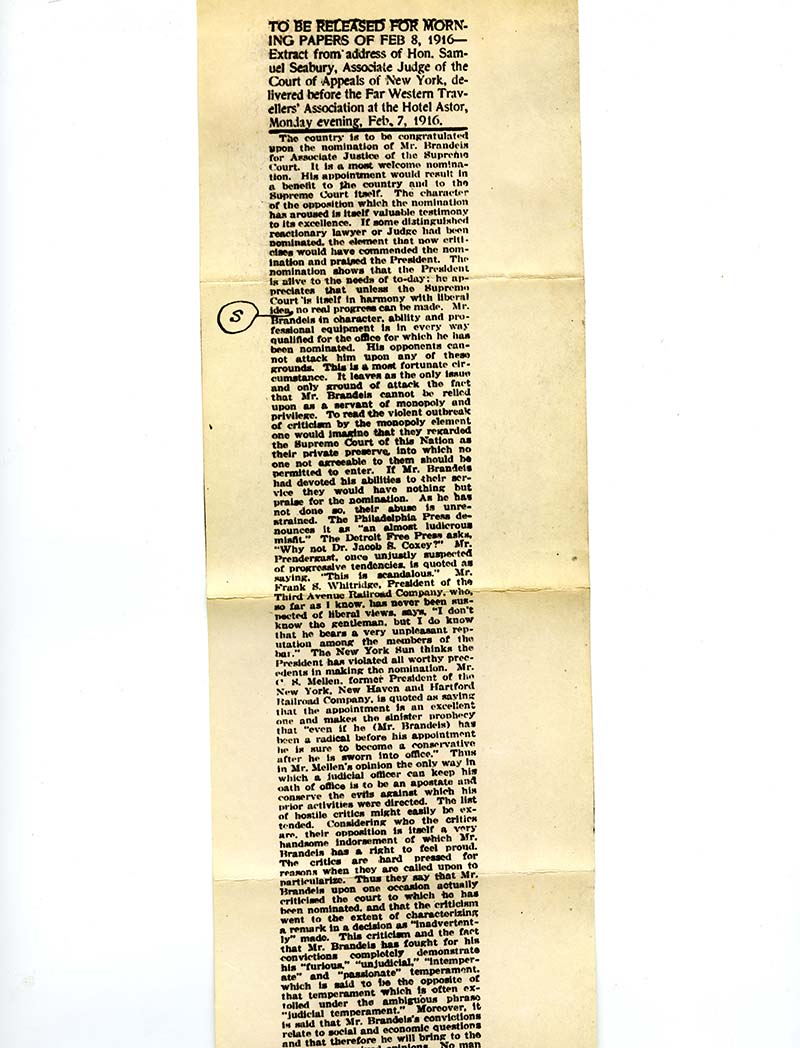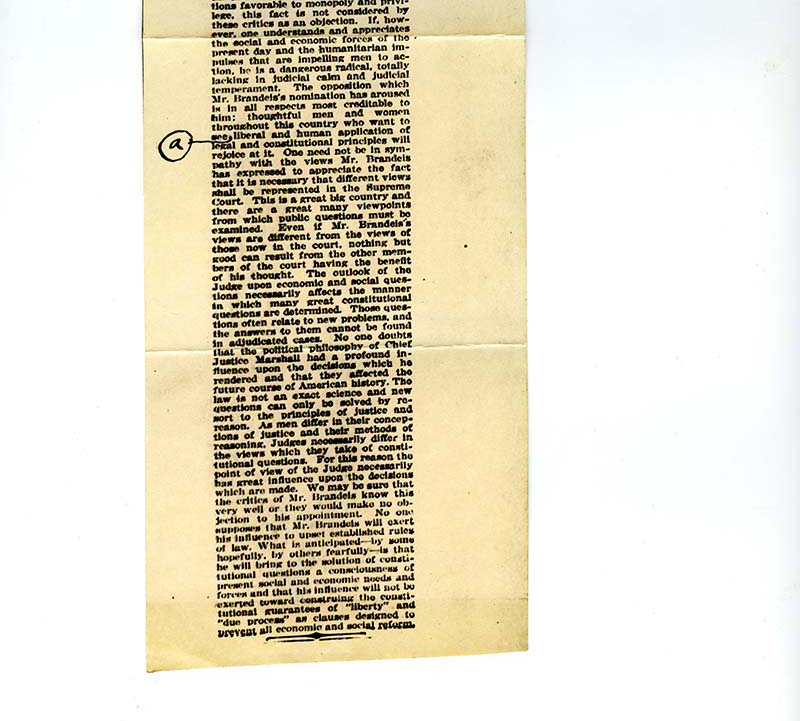Extract from the Address of
Hon. Samuel Seabury
Delivered before the Far Western Travellers’ Association at the Hotel Astor on February 7, 1916


Transcript
TO BE RELEASED FOR MORNING PAPERS OF FEB 8, 1916-- Extract from address of Hon. Samuel Seabury, Associate Judge of the Court of Appeals of New York, delivered before the Far Western Travellers’ Association at the Hotel Astor, Monday evening, Feb. 7, 1916.
The country is to be congratulated upon the nomination of Mr. Brandeis for Associate Justice of the Supreme Court. It is a most welcome nomination. His appointment would result in a benefit to the country and to the Supreme Court itself. The character of the opposition which the nomination has aroused is itself valuable testimony to its excellence. If some distinguished reactionary lawyer or Judge had been nominated, the element that now criticises would have commended the nomination and praised the President. The nomination shows that the President is alive to the needs of to-day: he appreciates that unless the Supreme Court is itself in harmony with liberal ideas no real progress can be made. Mr. Brandeis in character, ability and professional equipment is in every way qualified for the office for which he has been nominated. His opponents cannot attack him upon any of these grounds. This is a most fortunate circumstance. It leaves as the only issue and only ground of attack the fact that Mr. Brandeis cannot be relied upon as a servant of monopoly and privilege. To read the violent outbreak of criticism by the monopoly element one would imagine that they regarded the Supreme Court of this Nation as their private preserve, into which no one not agreeable to them should be permitted to enter. If Mr. Brandeis had devoted his abilities to their service they would have nothing but praise for the nomination. As he has not done so, their abuse is unrestrained. The Philadelphia Press denounces it as “an almost ludicrous misfit.” The Detroit Free Press asks, “Why not Dr. Jacob S. Coxey?” Mr. Prendergast, once unjustly suspected of progressive tendencies, is quoted as saying. “This is scandalous.” Mr. Frank S. Whitridge, President of the Third Avenue Railroad Company, who so far as I know, has neve been suspected of liberal views, says, “I don’t know the gentleman, but I do know that he bears a very unpleasant reputation among the members of the bar.” The News York Sun thinks the President has violated all worthy precedents in making the nomination. Mr. C.S. Mellen, former President of the New York, New Haven and Hartford Railroad Company, is quoted as saying that the appointment is an excellent one and makes the sinister prophecy that “even if he (Mr. Brandeis) has been a radical before his appointment he is sure to become a conservative after he is sworn into office.” Thus in Mr. Mellen’s opinion the only way in which a judicial officer can keep his oath of office is to be an apostate and conserve the evils against which his prior activities were directed. The list of hostile critics might easily be extended. Considering who the critics are, their opposition is itself a very handsome endorsement of which Mr. Brandeis has a right to feel proud. The critics are hard pressed for reasons when they are called upon to particularize. Thus they say that Mr. Brandeis upon one occasion actually criticised the court to which he has been nominated, and that the criticism went to the extent of characterizing a remark in a decision as “inadvertently” made. This criticism and the fact that Mr. Brandeis has fought for his convictions completely demonstrate his “furious,” “unjudicial,” “intemperate” and “passionate” temperament, which is said to be the opposite of that temperament which is often extolled under the ambiguous phrase “judicial temperament.” Moreover, it is said that Mr. Brandeis’s convictions relate to social and economic questions and that therefore he will bring to the [text missing] favorable to monopoly and privilege, this fact is not considered by these critics as an objection. If, however, one understands and appreciates the social and economic forces of the present day and the humanitarian impulses that are impelling men to action, he is a dangerous radical, totally lacking in judicial calm and judicial temperament. The opposition which Mr. Brandeis’s nomination has aroused is in all respects most creditable to him: thoughtful men and women throughout this country who want to see a liberal and human application of legal and constitutional principles will rejoice at it. One need not be in sympathy with the views Mr. Brandeis has expressed to appreciate the fact that it is necessary that different views shall be represented in the Supreme Court. This is a great big country and there are a great many viewpoints from which public questions must be examined. Even if Mr. Brandeis’s views are different from the views of those now in the court., nothing but good can result from the other members of the court having the benefit of his thought. The outlook of the judge upon economic and social questions necessarily affects the manner in which many great constitutional questions are determined. Those questions often relate to new problems, and the answers to them cannot be found in adjudicated cases. No one doubts that the political philosophy of Chief Justice Marshall had a profound influence upon the decisions which he rendered and that they affected the future course of American history. The law is not an exact science and new questions can only be solved by resort to the principles of justice and reason. As men differ in their conceptions of justice and their methods of reasoning. Judges necessarily differ in the views which they take of constitutional questions. For this reason the point of view of the judge necessarily has great influence upon the decisions which are made. We may be sure that the critics of Mr. Brandeis know this very well or they would make no objection to his appointment. No one supposes that Mr. Brandeis will exert his influence to upset established rules of law. What is anticipated-by some hopefully, by others fearfully-is that he will bring to the solution of constitutional questions and consciousness of present social and economic needs and forces and that his influence will not be exerted toward construing the constitutional guarantees of “liberty” and “due process” as clauses designed to prevent all economic and social reform.
| CREATOR | Samuel Seabury |
|---|---|
| DATE | 02/08/1916 |
| LOCATION | New York, New York |
| FORMAT | Text (Address) |
| LANGUAGE | English |
| COLLECTION | Louis Dembitz Brandeis Collection |
| BOX, SERIES | 63. I.IV.a.1 |
| RIGHTS | Copyright restrictions may apply. For permission to copy or use this image, contact the Robert D. Farber University Archives & Special Collections Department, Brandeis University Library |